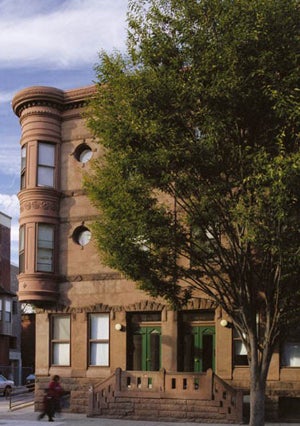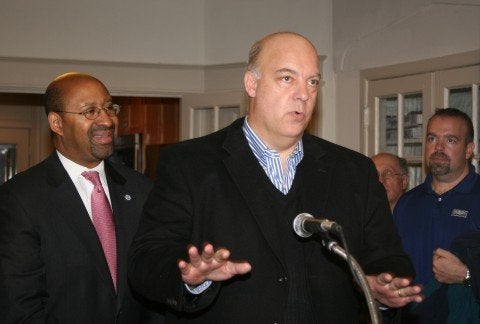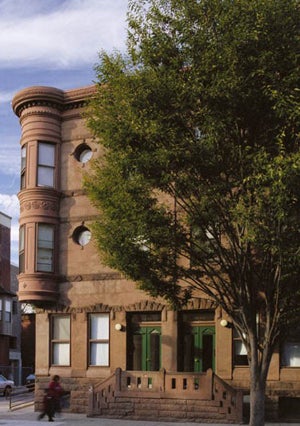RDA putting $66 Million in Federal funds to work
March 26, 2010
By Thomas J. Walsh
For PlanPhilly
The Redevelopment Authority, with the city’s Office of Housing and Community Development, on Monday will show off one of its many renewed city properties with an open inspection and dedication, celebrating the Neighborhood Stabilization Program (NSP), the first federal stimulus program in the city.
The NSP was created at the national level in 2008 and is unrelated to the failed Neighborhood Transformation Initiative started under the Street administration. Philadelphia has now been awarded two rounds of the federal NSP money – about $66 million in all – with the second coming in January via the American Recovery and Reinvestment Act of 2009. The money is being used for the renovation of foreclosed properties in neighborhoods all over the city.
“We’re probably managing more federal stimulus money than anybody else in the city right now,” said Terry Gillen, executive director of the RDA and senior economic adviser to Mayor Nutter. “We’re going to celebrate the completion of one of these houses.”
Properties in the first NSP round – $20 million – must be under contract and under construction by this coming September. The money is being used to rehab single family homes that have been foreclosed upon, and which are now vacant. Developers receive $20,000 per house after a property is sold, and buyers must earn less than 120 percent of the area’s median income.
“This money allows us to bring in a developer, rehab the house, put some subsidy in the house if we have to, and then sell it to a qualified buyer, who is low or moderate income,” said Gillen, adding that some of the developers are community development corporations.

Innova rehab project
NSP is far from a poverty program, said Jeffrey Allegretti, president of Center City-based Innova Services, which specializes in affordable housing.
The RDA “built this program from scratch,” Allegretti said. “Nothing like this existed. They’re going into neighborhoods that Philadelphia housing programs typically they have not gone into – Mayfair, Tacony, West Oak Lane, Overbrook. These are stable neighborhoods, and that’s kind of the point of the program – that one foreclosure on a block that becomes vacant is the beginning of instability. So the name has a meaning in this case.”
Innova has closed on eight NSP properties so far, with a handful of others in various stages of the acquisition process.
“It does three things,” Gillen said. “It eliminates vacant, foreclosed houses. It creates jobs – we’re creating about 150 construction jobs. And the third thing is getting qualified home buyers into housing in the neighborhood. It’s a great, great program.”
There are about 35 homes under construction or near completion now. Before the program is over, Gillen says about 150 houses will have been reclaimed. In Boston last week, Gillen said she was told by a senior official with the National Community Stabilization Trust that Philadelphia’s NSP was among the top five programs in the coutry.
“We’re considered a high-performing city by HUD,” Gillen told PlanPhilly, in an interview on Thursday. “So now we’re being asked to sit on panels and give advice to other cities. In other places, people are having trouble getting this money out the door. It’s a very complicated program. But we’re cranking out a couple houses a week now.”
The NSP is not yet tied in with any programs aimed at “greening” homes by methods such as weatherization, many of which are also funded with stimulus money. Gillen said that’s because most of those type of projects are targeted at owner-occupied houses.
However, “these are going to be owner-occupied houses, so we’ve been talking with the Department of Energy about getting some of that energy efficiency money for the NSP program. We think we can tap into some of that.”
Also, Allegretti said that all of the heating, air conditioning and lighting in the houses that Innova renovates are certified “Energy Star,” which is the environmental version of the Good Housekeeping seal of approval. They do major air sealing and put new roofs on every property, he said.
Round 2
A second round of NSP money, totaling $44 million, was awarded in January. The RDA will continue to do single family re-habs with the money, but it will also embark on new construction for affordable housing in three neighborhoods: Mantua, Nicetown (near the Wayne Junction train station) and Point Breeze.
In this additional aspect of the NSP, the RDA is looking for ways to leverage city money for green space, additional trees and transit improvements, among other things. Already, the City Planning Commission has partnered with the RDA to update long-range plans and zoning for those neighborhoods. The city’s Office of Housing is also involved.
“It’s a very competitive program,” Gillen said. “HUD got thousands of applications, and only a couple hundred cities got money. And we got the third largest grant of any city in the country, so it was a real sign that HUD has a lot of faith in Philadelphia, and they know we can get the money out.
“It’s an opportunity for us to really make a change in the neighborhoods. One of the requirements under NSP-2 is you have to show a significant impact in the neighborhood within three years, which is not much time in the housing world.”
That means a reduction in vacancies, a reduction in crime, or preferably both. Negotiations on specific impacts and measurements are still underway with HUD.
“It’s a new way for HUD to operate – they are being much more strict about performance,” Gillen said. “Cities that can perform are going to do well in the Obama administration, and cities that can’t are really going to struggle. That’s why we’re focused on getting this money spent, and spent well.”
Stimulus money for NSPs was also awarded in January to the Camden Redevelopment Agency ($12 million) and Camden’s Housing Authority ($14.1 million). Elsewhere in Pennsylvania, the city of Reading received $5 million. The Community Builders Inc., a national nonprofit urban housing developer with an office in Pittsburgh, was awarded $11.2 million. Community Builders has several projects in Pittsburgh underway, and has worked in Philadelphia in the Spring Garden neighborhood.
At Monday’s 10 a.m. event, Philadelphia Councilwoman Maria D. Quiñones-Sánchez will join Gillen to dedicate 4034 Markland Street (near the intersection of Hunting Park and Castor avenues), one of the first foreclosed properties in Philadelphia to be rehabilitated through the NSP.
“They are a bunch of very smart people who have worked through a lot of problems,” Allegretti said of the RDA. “The program today, eight months in, is a whole lot different from the program that was launched, because of their dynamic processes of feedback and improvement.”
Contact the reporter at thomaswalsh1@gmail.com.
ON THE WEB
National Community Stabilization Trust: http://stabilizationtrust.com/
NeighborWorks America: http://www.stablecommunities.org/
WHYY is your source for fact-based, in-depth journalism and information. As a nonprofit organization, we rely on financial support from readers like you. Please give today.





